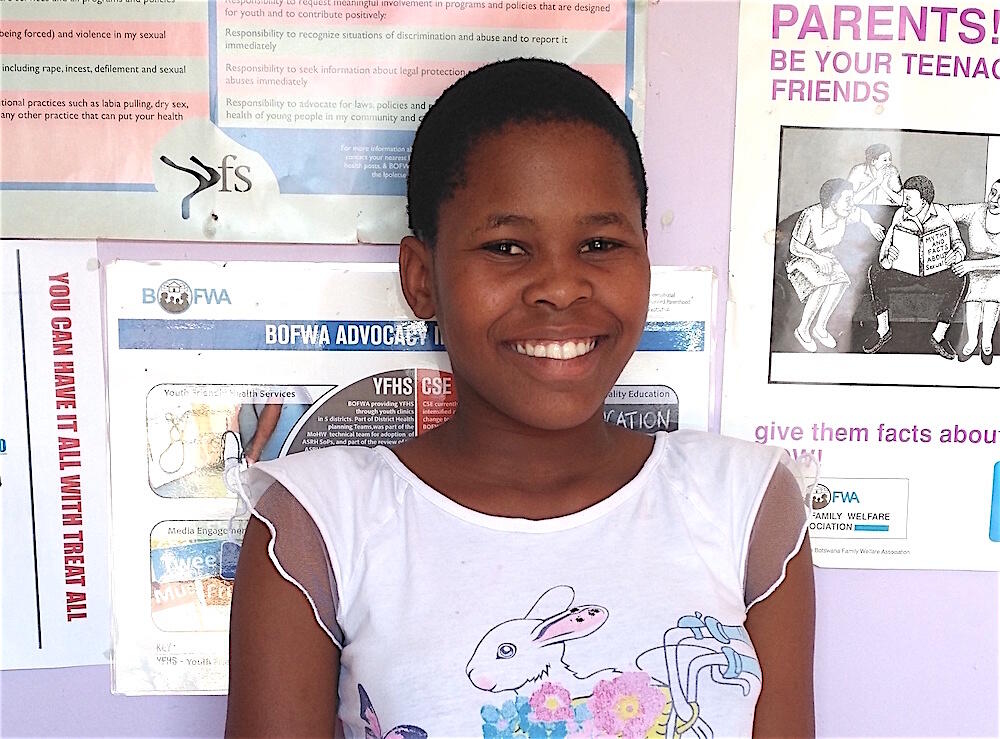SELOKOLELA, Botswana—Kenathata Moisakamo was too ashamed to tell her parents that she had started menstruating because of her peers’ stories that periods indicate when a girl becomes sexually active.
At her school in the small settlement she lives in far from the capital city, Gaborone, Kenathata, now 13, had learned briefly about menstruation in class. Because she had never had a conversation with anyone in her family to prepare her for her first period, she felt scared and embarrassed, and decided to keep it to herself. To cope with the bleeding, she cut a piece of cloth from an old t-shirt.
So it was a relief when her older sister, Ogaufi, asked about the blood stains on her clothes during her third monthly cycle. Even though the conversation was awkward, it meant that her sister would help her get sanitary pads and inform her mother of her needs going forward.
But another hurdle still faced Kenathata. Fearing that she might be ridiculed by her peers if they found out she was menstruating, she pretended to be sick in the first few months while having her period. She skipped school.
When I got my first period I was also ashamed of informing my mother. And when I finally told her, she only warned me against playing with boys as it would ‘get me pregnant’.
In their community, menstruation and sexuality are considered taboo and because of this, their family has never had open conversations on these topics, said her sister, Ogaufi.
“Menstruation is still considered a secret that is hardly discussed. When I got my first period I was also ashamed of informing my mother. And when I finally told her, she only warned me against playing with boys as it would ‘get me pregnant’,” Ogaufi said.
Why the shame and secrecy surrounding periods?
The two sisters are not alone in experiencing this. Many girls in Botswana have their first period before their parents talk to them about it. This is because periods have long been associated with shame, secrecy and misinformation, largely due to the prevailing conservative cultural attitudes. It means that girls are afraid to inform their parents or guardians when they start menstruating. As a result, they don’t get the assistance they need to manage their menstrual health right from the start.
Menstruation is a normal and essential process for all women, which no one should be ashamed of.
Menstruation is touched on only brief in biology lessons, and a comprehensive approach to menstrual health is left out. Nor do girls receive free sanitary pads at school. This means that many of them skip school when menstruating as they are unable to manage their periods adequately.
Because sexuality is also considered taboo, in many households parents do not discuss it openly with their children. Typically, sexuality education is left to teachers, as these conversations are considered embarrassing. Yet most students do not feel comfortable enough to engage in discussions in class for fear of being ridiculed by their classmates.
Importance of comprehensive sexuality education
Kenathata’s experience changed when she joined a comprehensive sexuality education (CSE) programme for out-of-school young people in her area. She learned about menstruation, how her body works and other issues of sexuality.
She now has the confidence to have open discussions with her peers and family members on these matters. Menstruation is a normal and essential process for all women, which no one should be ashamed of, she said.
Through the UNFPA-supported CSE sessions, boys and girls are empowered with knowledge that helps them make better choices regarding their sexual and reproductive health. They gain this knowledge in a youth-friendly space without any judgments being made, which promotes openness.
Kenathata is convinced that the secrecy that surrounds menstruating would end if all girls had an opportunity to attend CSE sessions like these, as they equipped her with the knowledge and confidence to speak openly with her family and friends about sexual and reproductive health.
Now that I understand a lot about contraceptives, menstruation and teenage pregnancy, I proudly share this knowledge with my peers and cousins who are not part of the programme.
“I used to be very shy, but I think it was because I lacked information,” she said. “Now that I understand a lot about contraceptives, menstruation and teenage pregnancy, I proudly share this knowledge with my peers and cousins who are not part of the programme.”
Her elder sister said Kenathata’s new-found confidence and knowledge have helped her overcome her shyness when talking about her periods.
All over the world, the educational opportunities, health and social status of millions of women and girls are undermined by poor menstrual hygiene caused by a lack of education on the issue, persistent taboos and stigma, limited access to menstrual products and poor sanitation infrastructure. As a result, their ability to reach their full potential is limited.
This is why UNFPA works to destigmatize menstruation and to empower girls to reach their full potential, by supporting CSE that includes menstrual health information, for both in-school and out-of-school young people. Girls should be empowered and enabled to manage their periods with dignity.


